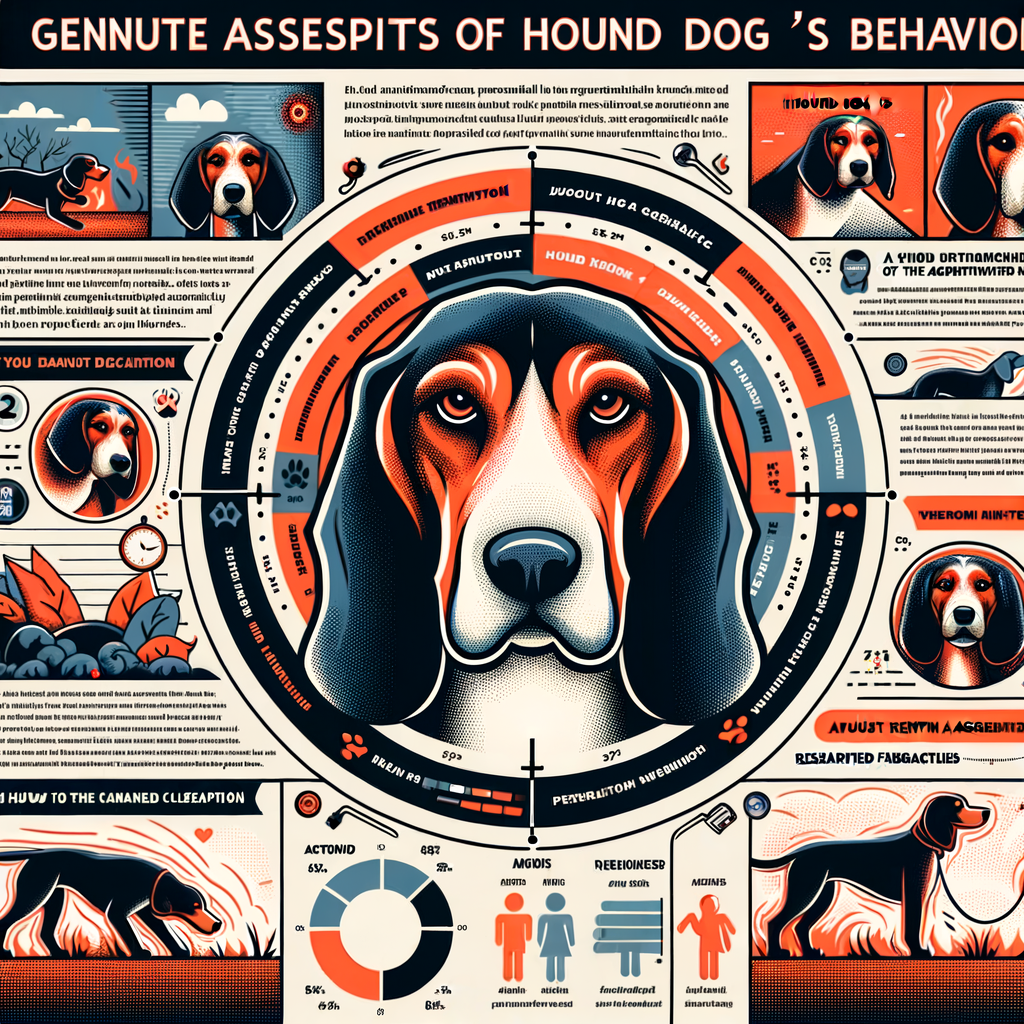
Introduction: Understanding Hound Dogs
When it comes to man’s best friend, few breeds are as misunderstood as the Hound Dog. In this article, we will delve into the world of Hound Dogs, shedding light on their behavior, debunking common misconceptions, and helping you understand these wonderful creatures better.
- Overview of Hound Dogs
- Hound Dogs Behavior
- Common misconceptions about Hound Dogs
Hound Dogs, known for their keen sense of smell and stamina, are a diverse group of hunting dogs. They come in a variety of sizes and shapes, from the small Dachshund to the large Irish Wolfhound. Despite their hunting heritage, most Hound Dogs today are kept as family pets, cherished for their loyalty and affectionate nature.
Hound Dogs are known for their friendly and easygoing nature. They are typically very social and get along well with other dogs and humans. However, due to their hunting background, they can be quite energetic and require regular exercise to keep them happy and healthy. They are also known for their intelligence and curiosity, which can sometimes lead them to be a bit stubborn.
There are several misconceptions about Hound Dogs that often lead to misunderstandings. One common myth is that all Hound Dogs are aggressive. This is simply not true. While they may be determined and focused when on a scent trail, they are generally gentle and friendly creatures. Another misconception is that Hound Dogs are lazy. In reality, while they do enjoy lounging around, they also need regular exercise to stay fit and healthy.
In the following sections, we will delve deeper into the nature of Hound Dogs, debunking myths and stereotypes, and revealing the truth about these fascinating creatures.
Aggression in Hound Dogs: The Myth and Reality
When it comes to hound dogs, there’s a common misconception that they are naturally aggressive. This belief, however, is more myth than reality. Let’s delve into the origins of this myth and how popular culture has played a role in perpetuating it.
The Hound Dogs Aggression Myth
Understanding the myth of aggression in hound dogs requires a look at its origins and how it has been influenced by popular culture.
- Origins of the myth: The myth of hound dogs being aggressive dates back to their use in hunting. Hound dogs, known for their exceptional sense of smell and tracking abilities, were often used to track and corner prey. This required a certain level of tenacity and determination, which was often mistaken for aggression. However, it’s important to understand that this behavior was a result of training and not an inherent trait of the breed.
- Popular culture influence: Popular culture has played a significant role in perpetuating the myth of hound dog aggression. From cartoons to movies, hound dogs are often portrayed as aggressive or menacing characters. This portrayal, while entertaining, is not an accurate representation of the breed. In reality, hound dogs are known for their loyalty, friendliness, and gentle nature.
It’s essential to separate fact from fiction when it comes to understanding hound dogs. While they may have been bred for hunting, this does not make them inherently aggressive. And while popular culture may portray them as such, it’s important to remember that these are fictional representations and not reflective of the breed’s true nature.
Hound Dogs Aggression Facts
When it comes to hound dogs, there are a lot of misconceptions about their behavior. Let’s take a closer look at the facts, backed by scientific studies and comparisons with other breeds.
- Scientific Studies on Hound Dogs Aggression
- Comparisons with Other Breeds
Contrary to popular belief, hound dogs are not inherently aggressive. According to a study published in the Journal of Veterinary Behavior, hound dogs, like any other breed, can exhibit aggressive behavior if they are not properly socialized or if they are mistreated. However, the study also found that hound dogs are no more likely to be aggressive than any other breed. In fact, they are often more docile and easy-going than many other breeds.
When compared to other breeds, hound dogs are often seen as less aggressive. For example, a study published in the Journal of Applied Animal Behavior Science found that hound dogs were less likely to show aggression towards strangers and other dogs than many other breeds, including terriers and working dogs. This is not to say that hound dogs cannot be aggressive, but rather that their temperament is generally more relaxed and friendly.
In conclusion, while any dog can exhibit aggressive behavior under certain circumstances, hound dogs are not inherently more aggressive than other breeds. It’s important to remember that a dog’s behavior is largely influenced by its upbringing and treatment. So, if you’re considering adopting a hound dog, rest assured that with proper care and training, they can make wonderful, loving pets.
Debunking Dog Aggression: Are Hound Dogs Aggressive?
One of the most common misconceptions about hound dogs is that they are inherently aggressive. This stereotype often stems from a lack of understanding about their unique temperament and personality traits. Let’s debunk this myth by delving deeper into the temperament of hound dogs.
Understanding Hound Dogs Temperament
Understanding a hound dog’s temperament requires a look at their key personality traits and the factors that influence their behavior. This will help us to see why they behave the way they do and whether aggression is a common trait among them.
- Key personality traits:
- Factors influencing temperament:
Hound dogs are known for their loyalty, intelligence, and independence. They are often eager to please and have a strong sense of smell, which makes them excellent hunters. However, they can also be stubborn at times, which can be mistaken for aggression if not properly understood.
Several factors can influence a hound dog’s temperament, including their upbringing, training, and socialization. A hound dog that is well-socialized and trained from a young age is less likely to show signs of aggression. On the other hand, a hound dog that has been neglected or abused may develop aggressive tendencies as a defense mechanism.
In conclusion, labeling hound dogs as aggressive is a sweeping generalization that does not take into account the individual personality and experiences of each dog. It is essential to understand that a dog’s behavior is often a reflection of their environment and upbringing, rather than their breed.
Case Studies: Hound Dogs Behavior
Let’s delve into two case studies that will help us understand the behavior of Hound Dogs better. These studies focus on different temperaments, providing a comprehensive view of this breed’s behavior.
- Case study 1: A Gentle Hound Dog
- Case study 2: An Aggressive Hound Dog – Understanding the Reasons
Meet Max, a three-year-old Hound Dog known for his gentle and friendly nature. Max lives with a family of four and is particularly fond of the youngest member, a six-year-old boy. Despite the common misconception about Hound Dogs being aggressive, Max has never shown any signs of aggression.
Max’s family attributes his gentle nature to his upbringing. They ensured Max was socialized from a young age, introducing him to various people and environments. This helped Max become comfortable around others and adapt to different situations. Max’s case shows that a Hound Dog’s behavior is significantly influenced by its upbringing and environment.
Next, we have Bella, a Hound Dog known for her aggressive behavior. Bella was adopted from a shelter at the age of two. She had a history of neglect and abuse, which led to her aggressive behavior. Bella is wary of strangers and can become aggressive when she feels threatened.
Bella’s case highlights that a Hound Dog’s aggressive behavior may stem from past trauma or fear. It’s important to understand that such behavior is not a breed characteristic but a result of individual circumstances. With proper care, patience, and professional help, Bella’s aggression has been significantly reduced.
These case studies demonstrate that a Hound Dog’s behavior is not solely determined by its breed. Factors such as upbringing, environment, and past experiences play a significant role in shaping a dog’s behavior. It’s crucial to remember this when considering the temperament of Hound Dogs.
Hound Dogs Nature: Beyond the Stereotypes
When it comes to hound dogs, there’s a lot more to these lovable creatures than meets the eye. It’s time to look beyond the stereotypes and delve into the unique personality traits that make hound dogs such a joy to be around.
Hound Dogs Personality Traits
Like humans, every hound dog has its own unique personality. However, there are some common traits that many hound dogs share. Let’s explore these traits, both positive and those that may pose challenges, and discuss how to manage them.
- Positive Traits
- Challenges and How to Manage Them
Hound dogs are known for their loyalty and affection. They are incredibly social animals, often forming strong bonds with their human families. They are also intelligent and curious, with a keen sense of smell that makes them excellent trackers. Their playful nature and love for outdoor activities make them great companions for active individuals or families.
Despite their many positive traits, hound dogs can also pose certain challenges. They can be stubborn at times, which can make training a bit difficult. Their strong sense of smell can sometimes lead them astray, especially during outdoor activities. However, these challenges can be managed with consistent training and patience. It’s also important to provide them with plenty of physical and mental stimulation to keep them happy and healthy.
In conclusion, hound dogs are more than just their stereotypes. They are loyal, affectionate, and intelligent animals with unique personalities. While they may pose certain challenges, these can be managed with the right approach and understanding. So, the next time you see a hound dog, remember to look beyond the stereotypes and appreciate them for the wonderful creatures they are.
Key Takeaways: Understanding Hound Dogs
- Importance of Early Socialization
- Role of Training and Discipline
- Understanding the Individual Dog, Not Just the Breed
Early socialization is crucial for hound dogs. It helps them become well-adjusted, confident, and friendly pets. Socialization involves exposing your hound dog to a variety of people, environments, and other animals while they are still young. This exposure helps them understand that these things are normal and nothing to be afraid of. According to a study by the American Veterinary Society of Animal Behavior, puppies that are properly socialized are less likely to develop behavior problems as adults.
Training and discipline play a significant role in a hound dog’s life. Hound dogs are known for their intelligence and eagerness to please, which makes them highly trainable. However, they can also be stubborn at times. Consistent, positive reinforcement training methods work best for this breed. Remember, patience and consistency are key. A well-trained hound dog is not only a joy to live with but also less likely to develop behavioral issues.
While it’s important to understand the general characteristics of hound dogs, it’s equally important to understand your individual dog. Each hound dog has its own personality, preferences, and quirks. Spend time with your dog, observe their behavior, and learn their likes and dislikes. This will help you build a stronger bond with your pet and cater to their specific needs. Remember, a happy dog is a healthy dog.
Conclusion: The Truth About Hound Dogs
As we wrap up this informative journey about Hound Dogs, it’s crucial to revisit the key points we’ve discussed and draw a final conclusion about their supposed aggression. Let’s debunk the myths and stereotypes and embrace the truth about these lovable creatures.
- Summary of key points
- Final thoughts on Hound Dogs aggression
We’ve learned that Hound Dogs are naturally friendly, sociable, and loyal. They are known for their keen sense of smell and tracking abilities, making them excellent hunting dogs. However, their aggression is often misunderstood. Like any other breed, Hound Dogs can exhibit aggressive behavior if they are mistreated, poorly trained, or not socialized properly. But it’s not a trait inherent to the breed.
Aggression in Hound Dogs, as we’ve seen, is more of a myth than reality. It’s a product of their environment and upbringing, not their breed. With proper training, socialization, and care, Hound Dogs can be the gentle, loving, and loyal companions they are known to be. It’s time we discard the stereotypes and appreciate Hound Dogs for their true nature.
In conclusion, Hound Dogs are not naturally aggressive. They are loving, loyal, and friendly dogs that can make wonderful pets. It’s our responsibility as pet owners to provide them with the care, training, and socialization they need to thrive. Let’s spread the truth about Hound Dogs and help create a more understanding and compassionate world for all breeds.








